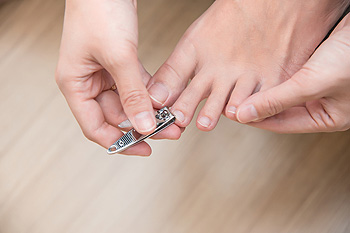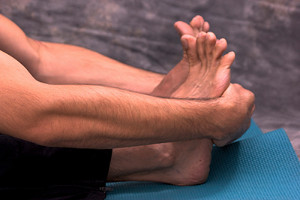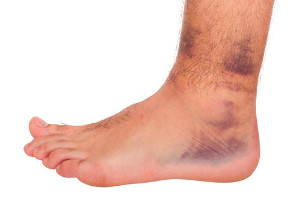1648 US Highway 130
North Brunswick, NJ 08902
 The medical condition that is referred to as tarsal tunnel syndrome typically occurs as a result of overusing the ankle and foot. This can happen when a patient frequently runs, or stands for extended periods of time. The nerve that is located on the inside of the foot and ankle may become compressed and inflamed, often causing pain and discomfort. Early treatment may prevent further damage from occurring. This includes resting the foot frequently throughout the day, and the type of exercise that is practiced may have to be altered so proper healing can take place. If the pain is severe, treatment that involves injections could be an option to consider. If you are affected by tarsal tunnel syndrome, it is suggested that you counsel with a podiatrist who can offer treatment options that are correct for you.
The medical condition that is referred to as tarsal tunnel syndrome typically occurs as a result of overusing the ankle and foot. This can happen when a patient frequently runs, or stands for extended periods of time. The nerve that is located on the inside of the foot and ankle may become compressed and inflamed, often causing pain and discomfort. Early treatment may prevent further damage from occurring. This includes resting the foot frequently throughout the day, and the type of exercise that is practiced may have to be altered so proper healing can take place. If the pain is severe, treatment that involves injections could be an option to consider. If you are affected by tarsal tunnel syndrome, it is suggested that you counsel with a podiatrist who can offer treatment options that are correct for you.
Tarsal tunnel syndrome can be very uncomfortable to live with. If you are experiencing tarsal tunnel syndrome, contact Dr. Robert Fink of Brunswick Foot & Ankle Group. Our doctor can provide the care you need to keep you pain-free and on your feet.
Tarsal Tunnel Syndrome
Tarsal tunnel syndrome, which can also be called tibial nerve dysfunction, is an uncommon condition of misfiring peripheral nerves in the foot. The tibial nerve is the peripheral nerve in the leg responsible for sensation and movement of the foot and calf muscles. In tarsal tunnel syndrome, the tibial nerve is damaged, causing problems with movement and feeling in the foot of the affected leg.
Common Cause of Tarsal Tunnel Syndrome
The Effects of Tarsal Tunnel Syndrome
A physical exam of the leg can help identify the presence of tarsal tunnel syndrome. Medical tests, such as a nerve biopsy, are also used to diagnose the condition. Patients may receive physical therapy and prescriptive medication. In extreme cases, some may require surgery.
If you have any questions please feel free to contact our office located in North Brunswick, NJ . We offer the newest diagnostic and treatment technologies for all your foot and ankle needs.
 When the feet feel good, the overall health of the body is positively affected. There are several methods that can be implemented for daily foot care. These include using warm water to wash your feet every day, applying a good moisturizer, and carefully trimming the toenails. Research has indicated feet are larger in the afternoon, and it is beneficial to purchase shoes in the middle of the day to ensure a maximum level of comfort. If you use community pools, showers or locker rooms, it is advised to wear appropriate shoes, which can help prevent foot conditions such as athlete's foot or toenail fungus. If you would like additional information about proper foot care, please consult with a podiatrist who can answer any questions you have.
When the feet feel good, the overall health of the body is positively affected. There are several methods that can be implemented for daily foot care. These include using warm water to wash your feet every day, applying a good moisturizer, and carefully trimming the toenails. Research has indicated feet are larger in the afternoon, and it is beneficial to purchase shoes in the middle of the day to ensure a maximum level of comfort. If you use community pools, showers or locker rooms, it is advised to wear appropriate shoes, which can help prevent foot conditions such as athlete's foot or toenail fungus. If you would like additional information about proper foot care, please consult with a podiatrist who can answer any questions you have.
Everyday foot care is very important to prevent infection and other foot ailments. If you need your feet checked, contact Dr. Robert Fink from Brunswick Foot & Ankle Group. Our doctor can provide the care you need to keep you pain-free and on your feet.
Everyday Foot Care
Often, people take care of their bodies, face and hair more so than they do for their feet. But the feet are a very important aspect of our bodies, and one that we should pay more attention to. Without our feet, we would not be able to perform most daily tasks.
It is best to check your feet regularly to make sure there are no new bruises or cuts that you may not have noticed before. For dry feet, moisturizer can easily be a remedy and can be applied as often as necessary to the affected areas. Wearing shoes that fit well can also help you maintain good foot health, as well as making it easier to walk and do daily activities without the stress or pain of ill-fitting shoes, high heels, or even flip flops. Wearing clean socks with closed shoes is important to ensure that sweat and bacteria do not accumulate within the shoe. Clean socks help to prevent Athlete’s foot, fungi problems, bad odors, and can absorb sweat.
If you have any questions please feel free to contact our office located in North Brunswick, NJ . We offer the newest diagnostic and treatment technologies for all your foot and ankle needs.
 The feet bear the weight of the body throughout the day, and it is important to properly take care of them. This includes practicing frequent foot stretches which may reduce common aches and pains in the feet. An effective stretch for the arch is done by rolling your foot on a tennis ball, and this is helpful in relaxing the muscles. The toes can be strengthened by standing on tiptoes for several seconds, followed by standing flat on the ground. The toes will feel refreshed when this stretching technique is repeated a few times. An additional stretch for the toes is accomplished by interlocking your fingers through your toes while gently rolling the ankle in circles. This is beneficial in strengthening the joints in the ankle. If you would like additional information about how stretching can benefit the feet, please consult with a podiatrist.
The feet bear the weight of the body throughout the day, and it is important to properly take care of them. This includes practicing frequent foot stretches which may reduce common aches and pains in the feet. An effective stretch for the arch is done by rolling your foot on a tennis ball, and this is helpful in relaxing the muscles. The toes can be strengthened by standing on tiptoes for several seconds, followed by standing flat on the ground. The toes will feel refreshed when this stretching technique is repeated a few times. An additional stretch for the toes is accomplished by interlocking your fingers through your toes while gently rolling the ankle in circles. This is beneficial in strengthening the joints in the ankle. If you would like additional information about how stretching can benefit the feet, please consult with a podiatrist.
Stretching the feet is a great way to prevent injuries. If you have any concerns with your feet consult with Dr. Robert Fink from Brunswick Foot & Ankle Group. Our doctor will assess your condition and provide you with quality foot and ankle treatment.
Stretching the Feet
Being the backbone of the body, the feet carry your entire weight and can easily become overexerted, causing cramps and pain. As with any body part, stretching your feet can serve many benefits. From increasing flexibility to even providing some pain relief, be sure to give your feet a stretch from time to time. This is especially important for athletes or anyone performing aerobic exercises, but anyone experiencing foot pain or is on their feet constantly should also engage in this practice.
Great ways to stretch your feet:
Individuals who tend to their feet by regular stretching every day should be able to minimize foot pain and prevent new problems from arising.
If you have any questions, please feel free to contact our office located in North Brunswick, NJ . We offer the newest diagnostic and treatment technologies for all your foot care needs.
 Many people experience a sprained ankle at some point in their lives. It occurs as a result of unexpectedly stepping off of a curb, tripping while walking downhill, or if you clumsily step down on your foot. The foot generally rolls to its side, and ligaments that connect the leg to the ankle may tear. Research has shown there are three types of ankle sprains. Patients who have a mild sprain may feel tenderness in and around the affected ankle. Pain will typically accompany a moderate sprain, and walking may be difficult to accomplish. If the ligament tears completely, this is considered to be a severe sprain, and medical attention should be sought as quickly as possible. If you have sprained your ankle, it is suggested that you seek the counsel of a podiatrist, who can determine the severity of the sprain, and begin the correct treatment.
Many people experience a sprained ankle at some point in their lives. It occurs as a result of unexpectedly stepping off of a curb, tripping while walking downhill, or if you clumsily step down on your foot. The foot generally rolls to its side, and ligaments that connect the leg to the ankle may tear. Research has shown there are three types of ankle sprains. Patients who have a mild sprain may feel tenderness in and around the affected ankle. Pain will typically accompany a moderate sprain, and walking may be difficult to accomplish. If the ligament tears completely, this is considered to be a severe sprain, and medical attention should be sought as quickly as possible. If you have sprained your ankle, it is suggested that you seek the counsel of a podiatrist, who can determine the severity of the sprain, and begin the correct treatment.
Ankle sprains are common but need immediate attention. If you need your feet checked, contact Dr. Robert Fink from Brunswick Foot & Ankle Group. Our doctor can provide the care you need to keep you pain-free and on your feet.
How Does an Ankle Sprain Occur?
Ankle sprains take place when the ligaments in your ankle are torn or stretched beyond their limits. There are multiple ways that the ankle can become injured, including twisting or rolling over onto your ankle, putting undue stress on it, or causing trauma to the ankle itself.
What Are the Symptoms?
Preventing a Sprain
Treatment of a Sprain
Treatment of a sprain depends on the severity. Many times, people are told to rest and remain off their feet completely, while others are given an air cast. If the sprain is very severe, surgery may be required.
If you have suffered an ankle sprain previously, you may want to consider additional support such as a brace and regular exercises to strengthen the ankle.
If you have any questions please feel free to contact our office located in North Brunswick, NJ . We offer the newest diagnostic and treatment technologies for all your foot and ankle needs.